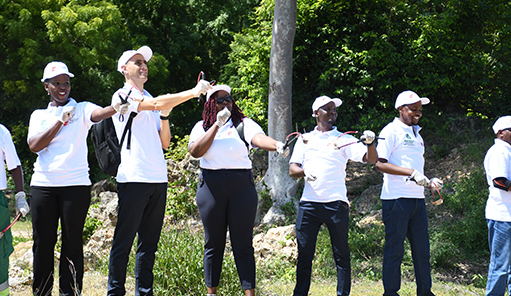Restoring the environment through ‘seed bombing’
Spearheaded by AGS Kenya and Bamburi Cement, the initiative had the partners meet at Haller Park on the outskirts of the bustling metro of Mombasa, Kenya’s second-largest city. An old limestone quarry from the 1950s, the park is a product of Bamburi Cement’s efforts, since 1971, to convert their disused pits into vibrant and diverse ecosystems of forest, grasslands and ponds.
The day began with informative presentations on the importance of environmental conservation, sustainable practices, and corporate citizenship. The group then moved outside for the main event. But with Seedballs Kenya as their partner, they weren’t about to start digging holes in the ground.
The AGS and eManage Africa teams had a go at ‘seed bombing’, launching seedballs into hard-to-reach areas of the park with nothing less than handheld catapaults.
The science of seedballs
At the heart of each seedball is a seed coated with ‘biochar’ – charcoal dust mixed with nutritious binders. This coating protects the seed from birds, rodents, and insects, as well as from extreme temperatures, so it is safe and ready for when rains arrive. Once they do, the ball is soaked and can retain the moisture for a prolonged period, encouraging germination.
Seedballs Kenya provided 50,000 balls for the event. These included an array of indigenous species such as Sesbania sesban, Acacia nilotica, Acacia polyacantha, and a mix of grasses.
This novel method of tree planting, developed by Seedballs Kenya, enables the large-scale reintroduction of trees and grass species in degraded areas. It is also cost effective, as biochar is made predominantly from charcoal waste, a resource that is abundant in a country where charcoal and firewood have been the primary energy sources for centuries. This results in a circular economy which not only helps restore deforested areas but also re-uses leftover waste from wood-intensive industries.
Rehabilitating forests worldwide
Thibault Malezieux, Managing Director of AGS Kenya and eManage Africa, emphasised his teams’ dedication to integrating environmental, social, and governance (ESG) principles into their operations: “As part of the Mobilitas Group, we have long supported reforestation efforts through the international NGO Planète Urgence, but since we are part of the Kenyan community, it is only natural for us to want to extend these efforts to our own backyard. What better way to do so than with an approach pioneered in Kenya.”

















